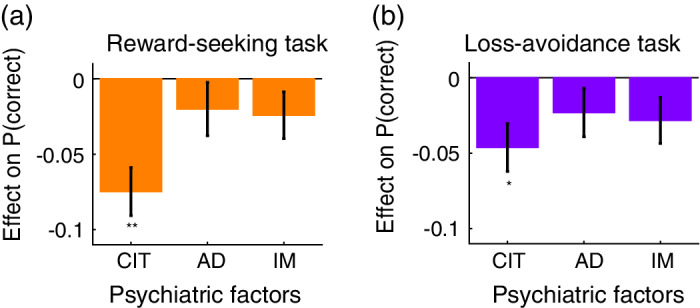Fig. 3.

Psychiatric factors (dimensions) and decision‐making performance. (a) Effects of psychiatric factors on the proportion of correct choices in the reward‐seeking task (mean SEM, n = 465 435). A correct choice was defined as the selection of the option with the highest reward (or no‐loss) probability in a given trial. The mean and SEM of the effects were estimated with a generalized linear mixed‐effect model. **P < 0.01 and *P < 0.05, FDR‐corrected by the number of tests (i.e. 3) in two‐tailed t‐tests (effect of CIT: corrected and uncorrected Ps < 0.001; AD: corrected and uncorrected Ps = 0.255; and IM: corrected P = 0.179 and uncorrected P = 0.119). CIT, ‘compulsive behaviour and intrusive thought’; AD, ‘anxious‐depression’; and IM, ‘impulsivity’. (b) Effects of psychiatric factors on the proportion of correct choices in the loss‐avoidance task (mean SEM, n = 476 115). Same format as in (a) (effect of CIT: corrected P = 0.011 and uncorrected P = 0.004; AD: corrected and uncorrected Ps = 0.150; and IM: corrected P = 0.095 and uncorrected P = 0.064).
